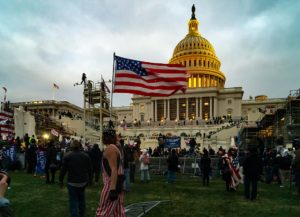
As a non-American, I hear confusing news on the status of the American right at the moment. In particular, I have problems understanding whether the influence of President Trump is over after the Capitol Hill revolt of early January. On the contrary, are Republicans unable to free themselves from his spell- perhaps, only at the very high price of giving birth to a third party?

Perhaps it is too soon to say: after all, Trump left the Oval Office only four months ago. What is pretty clear is that the Biden administration has deployed bigger guns than perhaps people expected. It is, in a sense, quite surprising. From this side of the pond, the understanding of Biden was that he would have been a more cautious president than the American left dreamt of in economic matters, while moving more left on so-called “cultural battle”. We expected a “traditional” Democrat, perhaps with a Clintonite flavor, who would have talked a bit more like AOC.
It seems things are going differently. In his latest Dispatch, Jonah Goldberg writes that “Biden has overshot LBJ’s legacy and gone straight for FDR instead”. Incidentally, that piece by Goldberg provides a splendid, succinct vision of what the New Deal really was: both a sophisticated philosophical enterprise and an adhocracy calling for “more money” no matter what. (aiming “to replace mere government by erecting a State. It was to supplant what Wilson decried as the “dumb clockworks” organization of government with a Darwinian vision of all parts of the body politic working together”)
Writes Goldberg:
Joe Biden’s trillion-here, trillion-there approach is as ad hoc as FDR’s in many ways. You look at some of the outlays in his proposals—a hundred billion for this, a hundred billion for that—and it becomes clear that the important thing is just to spend a hundred billion, or $2.4 trillion; what the money actually goes to is an afterthought.
What matters here is the size. We know that the government grows in crises: not only in size but also in scope. The pandemic opened the door to an astonishing growth in government, sometimes with measures which were supposed to be temporary but, as many temporary measures of the past, may be here to stay. The idea that the pandemic “changed everything” is so commonly accepted within the chattering classes that the debate over the Biden stimulus has been amazingly small, given its size. Some economists were skeptical and critical (read David Henderson on the stimulus here , for example) but it seems to me that most commentators are missing the magnitude, and the consequences, of what is happening.
In part, I suppose this is the result of “Trump fatigue”: for years anything coming out of the White House seemed “tremendous” and “great” and “terrific” and, in his opponents’ eyes, “out of control”. Hence Biden can benefit a great deal from being different from his more colorful predecessor, and perhaps get a pass on most things he does. In part, the whole political spectrum has shifted in a more interventionist direction. It is debatable if Republicans were really a beacon of small deficits and free trade before Trump, but at least they pretended to be and words matter a lot in politics.
Can a different vision be articulated, in order to regain ground to small government conservatism? The best attempt I have read so far is this long op-ed by Robert Doar, the President of the American Enterprise Institute. Writes Doar:
The early years of Trump’s term, when growth was solid and foreign enemies deterred, provided a rare window of opportunity to address America’s more complex and long-term problems. This opportunity was squandered. By failing to pursue overdue reforms to America’s entitlement programs, infrastructure, or immigration system, advocates of limited government missed their best chance to secure conservative-steered compromises that could withstand successive Democratic administrations.
Instead, we are now experiencing a blitz of Keynesian remedies to problems that don’t require radical solutions. Before the pandemic struck, Americans’ wages were rising at the fastest pace in decades, especially for those toward the bottom of the income ladder. Now as the pandemic is set to recede, the strong economy of 2019 could roar back. But the excessive spending has raised the risk of a surge in inflation, a specter even the left-leaning economist Larry Summers has cautioned against.
Rising inflation might end up being the least of our worries. The danger of big government is not bigness per se, but the further risks bigness entails, to both individual liberties and the economy more broadly.
Doar’s piece is an example of thoughtful conservatism. Is there a market for that, in today’s politics? Anyway, read the whole thing.

READER COMMENTS
Andrew_FL
Apr 12 2021 at 3:32pm
Such an opportunity, if it existed at all, was thoroughly squandered before Trump took office, having campaigned on the promise of refusing to reform entitlements.
Which I think essentially answers your question: No. Not the slightest bit.
Thomas Lee Hutcheson
Apr 12 2021 at 5:29pm
Trump campaigned on the platform to reduce growth by restricting immigration and trade. And he delivered!
Scott Sumner
Apr 12 2021 at 8:31pm
Because the first two stimulus bills were signed by Trump, it makes it hard for the GOP to criticize the third. What can they say? “We’d never do anything like that.”?
Regarding this comment:
It is debatable if Republicans were really a beacon of small deficits and free trade before Trump”
I don’t see how it’s debatable. They clearly were not a beacon of small deficits.
Roger McKinney
Apr 13 2021 at 3:17pm
That’s what the Tea Party said and why they would vote for the devil and Trump before they would vote for another establishment politician.
Roger McKinney
Apr 13 2021 at 3:14pm
I’m always surprised at how little people remember about how Trump got nominated then elected. He never got a majority in the primaries, polling usually around 30%. So at any time, someone like Cruz could have gotten the nomination if the rest of the three dozen in the race had pulled out and thrown him their vote. But the egos prevailed.
The Tea Partiers knew absolutely nothing at all about Trump. They voted against the establishment Republicans, not for Trump! Like me, they were tired of the McCains and Romneys ruling like socialists for decades and then campaigning like conservatives. We called the RINOs, Republican in name only. We were and are sick of establishment Republicans who fly the flag of the GOP platform while campaigning then break every principle when they’re elected and even hold it in contempt. Establishment, East Coast Republicans are moderate socialists like FDR.
Far more important to the nation than entitlements is reigning in regulations. They are killing business more than taxes or foreign competition. Trump made a good start at slowing the growth in regulations, but far more needs to be done.
BTW, thoughtfulness in US campaigns is hard. Getting out the vote requires buckets of hyperbole.
Anonymous
Apr 15 2021 at 10:04pm
“So at any time, someone like Cruz could have gotten the nomination if the rest of the three dozen in the race had pulled out and thrown him their vote. But the egos prevailed.”
I think this is not true. Other candidates cannot control what their voters do after they pull out. There was some effort towards this and I thought it would succeed, but it did not. Trump immediately started polling much higher after the field narrowed.
Tom DeMeo
Apr 16 2021 at 9:56am
Got to disagree on a couple of fronts.
It’s a long horizon issue, but entitlements are more important. Depending on how medical tech breaks, we could have a gruesome situation on our hands in a few decades.
As for regulations, I agree about you definition of the problem, but there is no way we can fix this the way Trump did. He did almost nothing durable. It was lazy. We can’t treat all regulations the same and we can’t fix our problems through obstruction.
We have to do the work. We have to prioritize defining what society really needs and doesn’t need and we have to be willing to let government do what we do need competently.
Frank
Apr 15 2021 at 4:34pm
Thoughtful conservatism? Trump’s voters were not conservatives. They were people who had merely been left behind by the political process, a process that gives money and status. They still exist, lots of them.
Comments are closed.